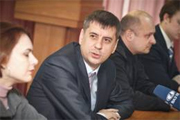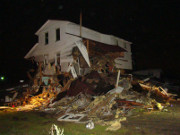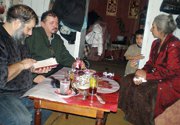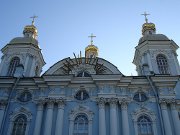 |
| Pastor Thomas Kang takes a plea deal in Russia, now free. |
Russia (MNN) ― American Pastor Thomas Kang felt compelled to plead guilty to charges in court just outside of Moscow.
On Tuesday, April 2, a hearing was held on the case of Pastor Kang. He and his lawyer decided to plead guilty in order to soften the punishment for the crime.
Wade Kusack, Russian Ministries Project Manager for Religious Freedom Issues in Eurasia, says, "He agreed to plead guilty and received six months in prison and 90,000 rubles, or $3,000, in penalties." Following that, Pastor Kang was released because he had already served seven months in jail.
Kusack says Pastor Kang didn't have a choice. "He accepted the offer from the prosecutor [to] plead guilty and be free. He was separated from his family for almost seven months. It was almost impossible for him to prove the truth." (Click here for more details.)
Kusack says, "We believe that the case was fabricated by the local authorities, that the pastor gave a 'bribe' under pressure from the police officer and had been abetted by his assistant. He believes this was a test by authorities to put pressure on religious minorities. I am afraid they will practice such a situation in the future on other minorities in the future.
The following is the statement by the Russian Guild of Experts on Religion and Law:
Increasingly in Russia, prosecutorial agencies take action against the faithful, against Christian missionaries, and these actions are not, formally, prosecution initiated on the basis of their religious beliefs. Essentially, representatives of various faiths are provoked, and said provocations result in criminal, or other action.
Kusack says, "In this regard, the Guild of Experts on Religion and Law calls on the Investigative Committee of Russia, the Prosecutor General's Office, the Public Chamber of the Russian Federation, and the general public to take note of the case of the Protestant Pastor Thomas Kang, a U.S. citizen, who, as a result of obvious provocation, is under investigation for bribery."
The case isn't completely over. Kusack says authorities took personal belongings from him. "There are many things that just disappeared from his apartment: jewelry, 28,000 rubles, and more things. The lawyer has initiated a case against the police officers who searched his apartment."
Kusack also says Pastor Kang will have another issue facing him. "There's a good chance that Pastor will be deported from Russia because of his so-called 'criminal' past. I don't know what will happen."
Actions such as this, which are clearly targeted at believers who are persona non grata (an unwelcome persons), as well as at active preachers who are unable to defend themselves, will inflict damage on Russia's international reputation as a Christian country. Kusack says, "What transpired with Pastor Kang is a case of blatant persecution on the basis of religion, aided by criminal provocation. There is no doubt that the actions against Pastor Kang were taken with the aim of stamping out the Christian community which he created, and developing a means of expelling him from Russia."
Kusack continues, "We hope that, both within Russia and abroad, the public will respond vigorously to such blatant violations of the rights of believers to religious freedom and freedom to practice their beliefs, which are more and more frequently being threatened under various pretexts on the territory of Russia."












